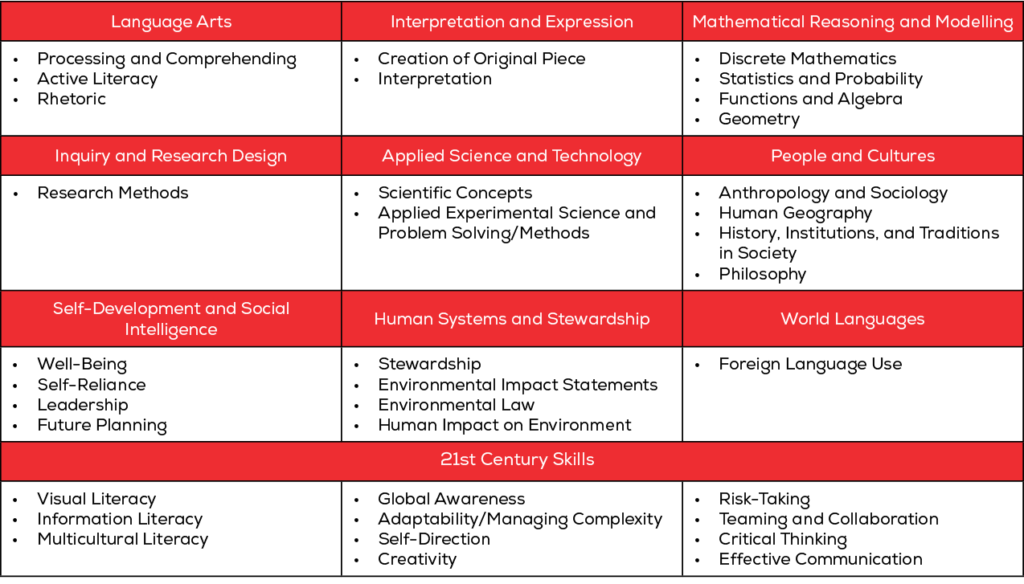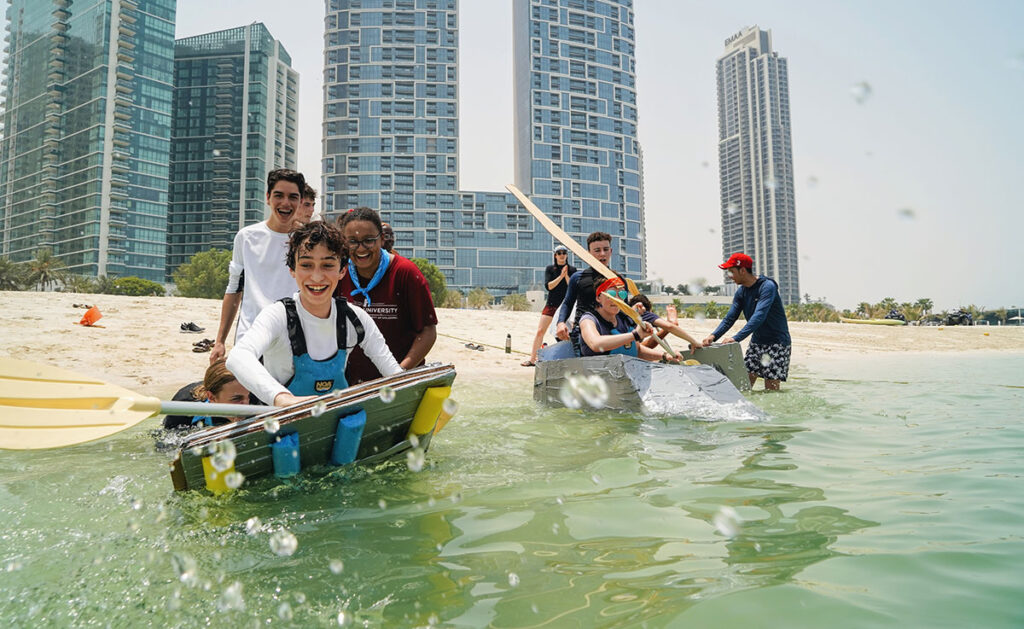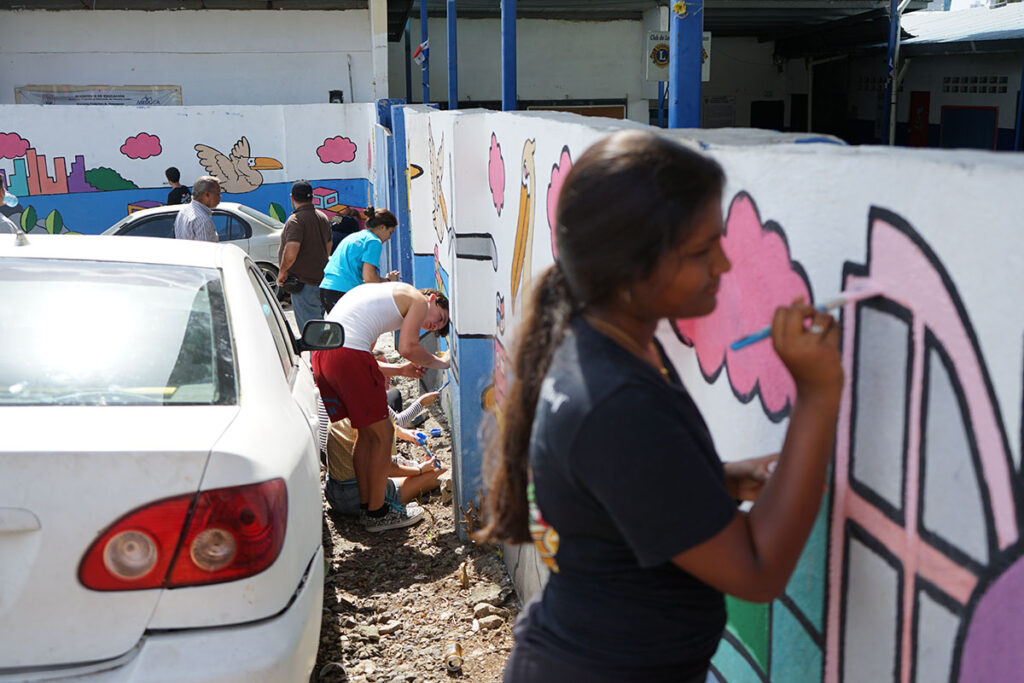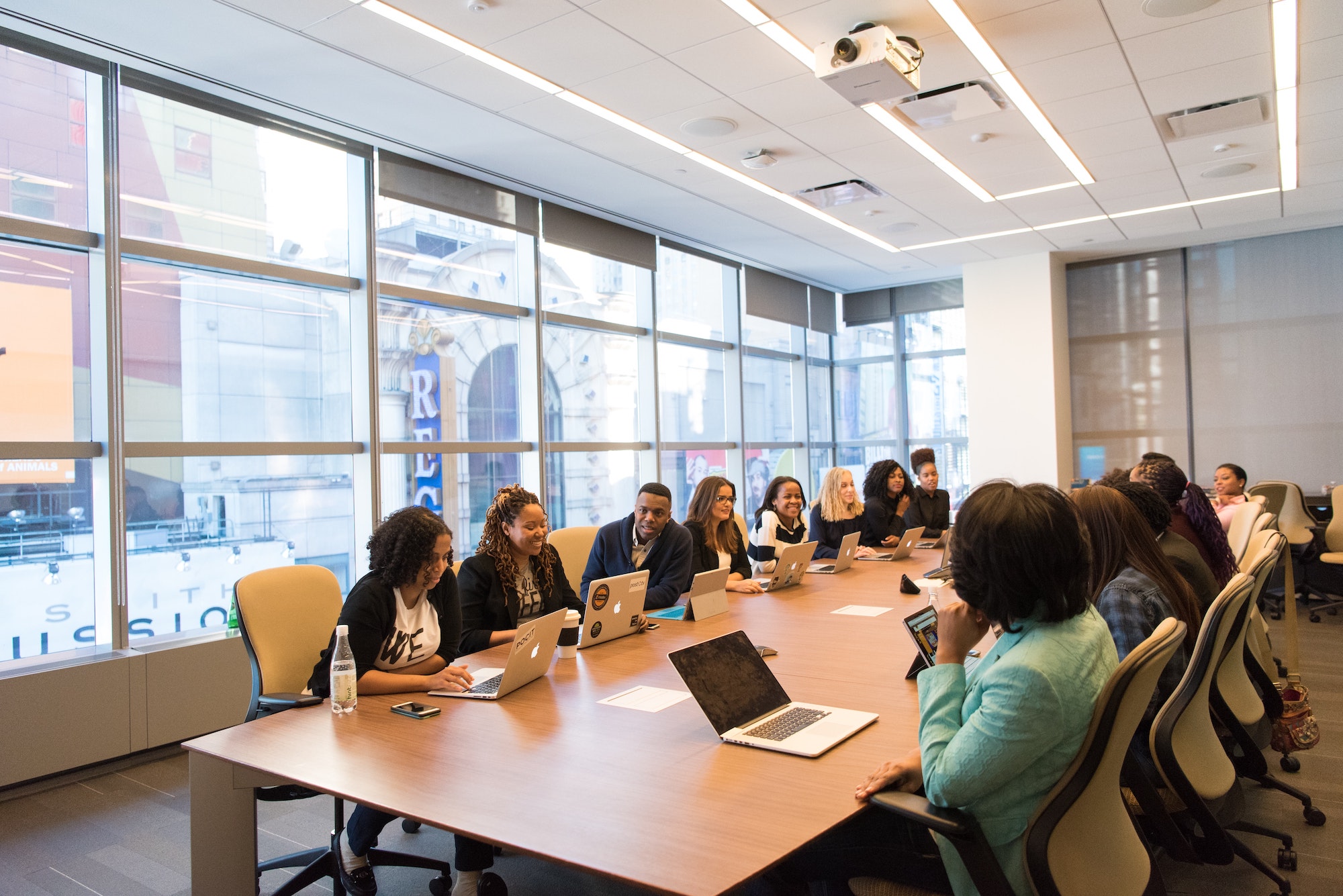A traveling IB high school where students live and study in four different countries per year
THINK Global School is a traveling IB high school where students live and study in four different countries per year, combining a top-notch education with place-based learning in three countries per year.
THINK Global School (TGS) is a private, non-profit high school that travels the world, allowing students the chance to study in three new international cities each academic year. Our students represent over 20 countries and bring a variety of experiences, talents, interests, and perspectives to our school. THINK Global School challenges learners, through firsthand experiences of global travel, to become compassionate individuals who are curious and knowledgeable about the world and motivated to affect meaningful change.
Our partner IB World Schools provide classrooms and school facilities. From there, we integrate place-based learning at some of the most significant sites in the world. We’ve had Mandarin lessons at the Great Wall of China, studied the theory of evolution in the Galapagos, and studied ancient culture among the Aboriginal people of Australia.
School accreditations: IB World School and Western Association of Schools and Colleges (WASC)
Program Highlights
Live in 4 different countries per year, 12 countries in all
Learn about the world firsthand through direct experiences and conversations with locals
Gain a student-centered education through project-based learning
With only 30 students per cohort and a 4:1 student-teacher ratio, you come first
A truly global classroom: our students hail from over 30 countries
Our students represent a diversity of countries, languages, experiences, passions, and talents.
Here’s what our students share in common:
A desire for an unconventional, progressive high school experience that engages global issues directly
A thirst for active, project-based learning that cultivates personal characteristics as much as academic success
A record reflecting a strong work ethic, drive for excellence, and self-motivation
A commitment to improving themselves, their communities, and the world
Exceptional maturity, adaptability, and resilience in unfamiliar situations
Advanced written and oral English skills; English is our language of instruction
A strong community orientation, collaborative spirit, and positive attitude
Parents who are active and supportive participants in our innovative school model and community
Through development in three key areas, the Changemaker Curriculum builds informed, intelligent global citizens who are empowered to enact real and lasting change.
We believe that education should connect you to the world around you, providing context and insight into today’s most pressing issues. Drawing from the 21st Century’s most innovative and effective educational models, the Changemaker Curriculum combines high academic standards with interdisciplinary, project-based learning—so your environment informs your studies and your studies give meaning to your environment.
Mastery
The Changemaker Curriculum focuses on mastering skills and concepts instead of regurgitating facts. We divide level of mastery into three stages: Apprentice (can remember and understand), Specialist (can analyze, evaluate, and apply), and Master (can create new ideas and teach others). At THINK Global School, you’ll gain a level of Specialist or higher in academic disciplines including mathematics, science, English, social science, world language, art, physical education and health, and careers, while attaining mastership of the subjects that intrigue you most.
Autonomy
Through a robust advisory program and continuous, constructive academic feedback, you’ll gain the skills and knowledge to become a self-guided learner and remain engaged in learning throughout your life.
Purpose
Developing as an individual is important, but it’s just as important to develop a sense of belonging to something greater than yourself. No matter how you choose to create change, we’re devoted to helping you find the causes you’re passionate about and figure out how to make a real and lasting difference
An Academic Calendar for Non-Stop Learning
Eight weeks on. Five weeks off. All year long. Our unique academic calendar fully immerses you in four countries a year, taking advantage of the best times to explore climates ranging from tropical jungles to icy fjords. It also offers more time off to process your experiences, pursue internships or student-designed projects, or simply relax with friends and family back home.
Each session begins with one week of online preparation that can be done from home (or anywhere!). During this week you’ll select your project-based learning module, finalize your areas for a student-designed project, begin research assignments, and ramp up cultural and language skills.
The online preparation week ensures that you waste no time diving into life in your new host country, where you’ll spend seven weeks pursuing group and independent projects directly related to your environment. Expect to fill your days with exploration, experiments, lectures, field trips, scientific and mathematical modeling, reading and writing, physical activity, documenting your experiences—and, of course, plenty of time to rest, relax, and socialize!
Authentic Experiences Through Project-Based Learning
By engaging in an array of projects that enhance your teamwork, problem-solving, and curiosity skills, you’ll transform into a passionate and multifaceted citizen, able to adapt and thrive in an increasingly globalized world.
In each location, you’ll select from one of three teacher-led modules to participate in for the eight-week term. Teacher-led modules combine multiple academic subjects at once and are designed to help you answer key questions about the world around you.
Modules at THINK Global School are designed and overseen by our educators, yet structured in a way that provides agency and flexibility to learn in ways that work best for you.
Answer Challenging Driving Questions
Each module revolves around a driving question relevant to your surroundings. In addition to focusing the module’s scope, the driving question helps communicate its purpose and set key standards for project work. During our Bosnia & Herzegovina term, for example, while students were exploring the process of reconciliation, they were asked to answer the following driving question:
How can we convey the complexities of ethnic and religious reconciliation through our experience of Bosnia and Herzegovina?
Driving questions are unique and open-ended, ensuring you’ll develop a wide range of fundamental and 21st-century skills as you explore the world and build upon your knowledge base.
A Team-Based Approach
For each teacher-led module, you’ll work in teams to gather facts, look for correlations, and evaluate possible solutions to the driving question. Along the way, you and your teammates will Q&A with local experts, take meaningful field trips, and regularly engage with the local community. It won’t take long before you realize just how much your global experiences deepen your projects’ meaning and amplify their impact.
Terms culminate with a project-based showcase, where you and your teammates will demonstrate your learning by presenting your module’s final product before a live audience.
Student-Designed Projects
With the guidance of your academic mentor, you’ll pursue 3-5 student-designed academic projects per semester.
In personal projects, you’ll formulate your own driving questions and select the learning targets and 21st-century skills you’d like to focus on. It’s an opportunity to pursue your passions or tackle a subject you’d like to become more familiar with.
Personal projects can take many forms, including completing an additional AP course, conducting scientific research and presenting your findings, crafting an original piece of art, or creating a paper or presentation to document your new understanding of an element of local culture or history.
Your mentor will help plan and evaluate your projects, tracking them against the school’s learning targets to ensure that you’re getting a well-rounded education covering all academic disciplines.
Personal Project Spotlight: Ecology of the Mind
For her mastery project, Class of 2020 student Soeun K. set out to create a work of art that explores our world by focusing on its most essential component: the mind. In doing so, Soeun endeavored to answer the following driving question: How can I acquire a deep understanding of Buddhist philosophies and their perspectives on the self and the world by creating an original short film?
To do so, Soeun spent time learning about the basis of cognition, behavior, and data collection alongside filmmaking techniques. For the latter, she chose Ashoka Fellow and documentary filmmaker Chanpil Jung as her project mentor, who taught her a variety of invaluable skills related to photography, filmmaking, and visual literacy.
For the second stage of her project, Soeun embarked on an 11-day filming excursion at a remote Mihwangsa temple in Haenam, South Korea. Here she interviewed a Buddhist monk, Kum Kang Sunim, and heard him share centuries-old Buddhist insights, which Soeun believes have the potential to revolutionize cognitive science. Alongside filming Kum Kang Sunim, Soeun turned her camera to capture the temple inhabitants’ everyday routines and Haenam’s surrounding natural beauty.
Learning Targets
Integral to teacher-led modules and student-designed projects are learning targets, which form the backbone of the Changemaker Curriculum. At their core, learning targets provide a measuring stick against which our students can assess their acquisition of knowledge. At the start of each project or module, students select the learning targets they would like to focus on and then provide a clear statement of what they aim to accomplish through their module or project work.
Including 21st century skills (skills to be applied to our host countries and the world), there are ten different categories containing many subcategories of learning targets, which collectively represent a broad spectrum of learning. Considering projects at THINK Global School are multidisciplinary, they typically consist of learning targets from numerous categories.
The Learning Targets categories and subcategories are:

Each of these subcategories is made up of numerous learning targets, and there are 122 learning targets in all. All students must achieve the rank of novice in all of our learning targets, the rank of specialist in 70% of our learning targets, and complete at least one mastery project to meet the graduation requirements for THINK Global School. These standards ensure that every TGS student receives a comprehensive education while also allowing them to focus on the learning targets and relevant skills they genuinely care about.
A Focus on Well-being
Social and Emotional Development

Studies have shown a direct correlation between emotional health and learning effectiveness, which is why we make personal growth an integral part of your education.
Our comprehensive student wellness program focuses on social and emotional learning, the mind-body connection, character, and mindfulness. You’ll work with your advisor to craft an evolving personal wellness plan that may involve yoga and meditation one semester, self-discovery and social mediation the next, and organizing a soccer league the following.
The result? Students graduate as grounded individuals with exceptional empathy and strong interpersonal skills.
Service Learning
Nothing embodies our core value of empathy more than the Changemaker Curriculum’s service-learning component. Our service-learning program is driven by a student-community partnership in which students identify real needs and work with one another and community leaders to address them actively.

Service-learning projects in the past have involved advocating for indigenous land rights, teaching English, building and repairing schools, and demonstrating the basics of dental and female hygiene to schoolchildren. Students can expect to lead and take part in community efforts that resonate with their passions and evolve depending on where we are in the world.
College Readiness
Learn how The Changemaker Curriculum makes you a rock-solid college candidate and prepare you for post-secondary education and beyond. More detailed information on college preparation can be found here.
Advanced Placement
All students enrolled at THINK Global School participate in two Advanced Placement courses: AP Seminar and AP Research. These multidisciplinary courses, which encourage students to demonstrate critical thinking, collaboration, and academic research skills, are seamlessly incorporated into the Changemaker Curriculum through the module and personal project work that students engage in each term.
In addition to AP Seminar and AP Research, all students who attend THINK Global School have the option of self-preparing and taking any Advanced Placement exams offered. Students who elect to take the exams have the opportunity to do so during the month of May each school year. Each student may take up to six exams total during the course of their THINK Global School career.
To determine if the Advanced Placement exams are necessary for their plans post-graduation, each enrolled student sits down with their advisor and counselor to determine a personalized plan. If a student would like to sit one or multiple AP exams, assistance is available in developing a self-study program through their advisor and counselor.
The Capstone Project
The Capstone Project is a multi-term individual project on the topic of your choice that culminates in a presentation to the THINK Global School community before graduation. Capstone Projects may take the form of studying a global issue and designing a product or program to help address it, conducting a scientific study and presenting your findings, creating a documentary film, or other creative ways to demonstrate mastery of a subject.
Academic Portfolio
As you make your way through the Changemaker Curriculum, you’ll create multiple forms of academic output such as research papers, multimedia presentations, films, works of art, and creative writing. These projects go into your academic portfolio, a digital collection that showcases your progress for evaluation and assessment. As you near matriculation, you’ll edit your academic portfolio to show a body of your most substantial work to universities and colleges.
THINK Global School is a unique model of learning that works best for students who are highly motivated, self-sufficient, intellectually curious, and community-oriented. To determine if you’re a good fit for our one-of-a-kind community, the application process digs deep into who you are as a student and a person – and gives you the opportunity to get to know us as well.
Applications for the 2023-2024 school year are closed, but we welcome early inquiries for 2024-2025 and future school years. See our application deadlines and other important dates.
Your home base during the admissions process will be your personal online application page. You’ll have an individual username and password to enter and exit the application as you move through the process.
Step 1:Initial Application
Student questions
Most recent grade report
Emotional quotient questionnaire
Parent questions
Step 2:Admission Staff Interview
If you are selected for an interview, we’ll schedule a 1.5 hour video call with you and your parents to get to know you a little better and discuss your educational and personal goals.
Step 3:Full Application
If you advance after the initial interview, you will be required to complete the full online application and strengths assessment.
This includes:
Additional student questions and an essay
Additional parent questions
School transcripts for the past two complete academic school years
Recommendation forms from your school counselor and English teacher
VIA Character Strengths Assessment
Scholarship application, if applicable
Step 4:Faculty Interviews
If you are selected for final interviews, we’ll invite you and your parents to meet with members of the TGS faculty via video conference. Parents and students may be invited for more than one final interview.
After the faculty interviews, the TGS Admission Committee will make final decisions and place accepted candidates in their determined cohort. You will get a decision notification according to your selected application timeline: 5 January 2023 for Early Decision and 31 March 2023 for Regular Decision.
2023-24Application Dates
| Application Process For 2023-2024 candidates | Early Decision Applicants Apply by 9 September 2022 and get decision by 5 January 2023 | Regular Decision Applicants Apply by 1 January 2023 and get decision by 31 March 2023 |
| Step 1 – Initial Application | Due by 9 September 2022 | Due by 1 January 2023 |
| Step 2 – Admission Staff Interview | September 2022 | January 2023 |
| Step 3 – Full Application | October 2022 | January – February 2023 |
| Step 4 – Faculty Interviews | November 2022 | February 2023 |
| Notifications | Sent by 5 January 2023 | Sent by 31 March 2023 |



